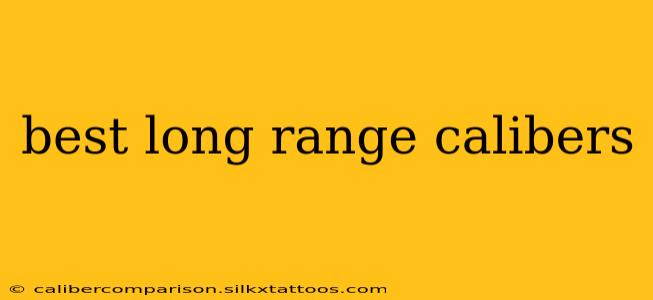Choosing the right caliber for long-range shooting is crucial. It's not just about hitting the target; it's about consistent accuracy, manageable recoil, and effective energy delivery at extended distances. This guide explores some of the best long-range calibers, considering factors like ballistic performance, availability, and cost. We’ll delve beyond simple comparisons, providing insights to help you make an informed decision based on your specific needs and shooting style.
Understanding Long-Range Shooting Needs
Before diving into specific calibers, let's define what constitutes "long range." Generally, long-range shooting is considered anything beyond 600 yards (549 meters). Beyond this distance, factors like wind drift, bullet drop, and atmospheric conditions become significantly more impactful. Therefore, choosing a cartridge with superior ballistic characteristics is paramount.
Key Factors to Consider:
- Ballistic Coefficient (BC): A higher BC means the bullet is less affected by wind and retains velocity better over distance. This is a critical factor in long-range accuracy.
- Recoil: Excessive recoil can disrupt your shooting form, leading to inaccuracy. Consider your physical capabilities and shooting experience when selecting a caliber.
- Cost: Ammunition costs can add up quickly, especially with long-range shooting, which often requires more rounds for practice and refinement.
- Availability: Ensure the chosen ammunition is readily available in your area. Certain calibers may be less common or more expensive to source.
Top Contenders: Best Long-Range Calibers
Several calibers consistently excel in long-range shooting. Here are some of the top performers, categorized for clarity:
Magnum Calibers: Powerhouses for Extreme Distance
- .300 Winchester Magnum: A classic choice, offering a balance between power, accuracy, and manageable recoil. Its widespread availability and diverse ammunition options make it a popular choice for long-range hunters and target shooters.
- .338 Lapua Magnum: This powerhouse is renowned for its exceptional long-range capabilities. Its heavier bullets boast an extremely high BC, resulting in minimal wind drift and excellent trajectory. However, it's known for significant recoil.
- 7mm Remington Magnum: This caliber strikes a balance between power and recoil, offering impressive accuracy at long ranges. It's a versatile option suitable for hunting and target shooting.
Non-Magnum Calibers: Accuracy and Efficiency
- 6.5 Creedmoor: A rapidly growing favorite, the 6.5 Creedmoor offers exceptional accuracy and moderate recoil, making it a top choice for both beginners and experienced long-range shooters. Its relatively low cost and excellent ballistic performance have contributed to its widespread popularity.
- 6mm Creedmoor: Similar to the 6.5, but with even less recoil and a slightly flatter trajectory at extended ranges.
- .260 Remington: This caliber is known for its exceptional accuracy and mild recoil, making it suitable for precision shooting. While not as powerful as some magnum calibers, its accuracy at longer ranges is impressive.
Beyond the Caliber: Factors Affecting Long-Range Accuracy
Choosing the right caliber is only part of the equation. Several other factors significantly impact long-range accuracy:
- Rifle: The quality of your rifle, including its barrel, action, and stock, will greatly influence accuracy. A high-quality rifle is essential for consistent performance at long distances.
- Optics: High-quality optics with sufficient magnification and clarity are critical for accurate target identification and shot placement at long range.
- Ammunition: Using consistent, high-quality ammunition is crucial. Variations in bullet weight, shape, and velocity can significantly impact accuracy.
- Technique: Proper shooting technique, including breathing control, trigger squeeze, and follow-through, are paramount for consistent accuracy. Training and practice are essential.
- Environmental Conditions: Wind, temperature, and humidity all affect bullet trajectory. Understanding these factors and making necessary adjustments is vital for long-range success.
Conclusion: Finding Your Ideal Long-Range Caliber
The "best" long-range caliber depends heavily on your individual needs and priorities. Consider your experience level, physical capabilities, intended use (hunting vs. target shooting), budget, and ammunition availability. Thoroughly research each caliber, consider its pros and cons, and don't hesitate to seek advice from experienced long-range shooters before making your decision. Remember, consistent practice and proper technique are just as critical as choosing the right tools for success at long distances.

